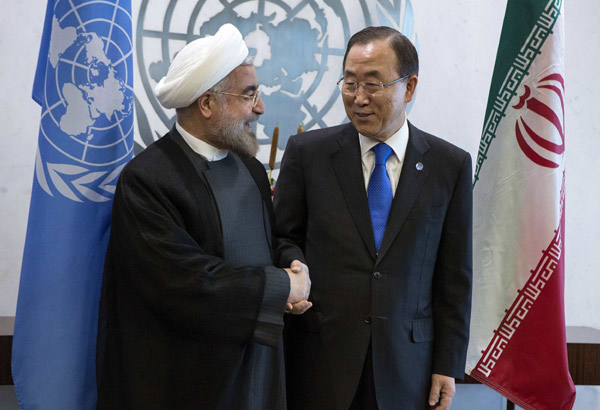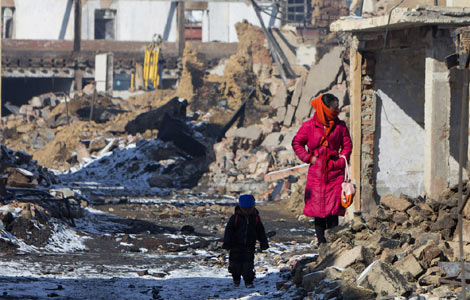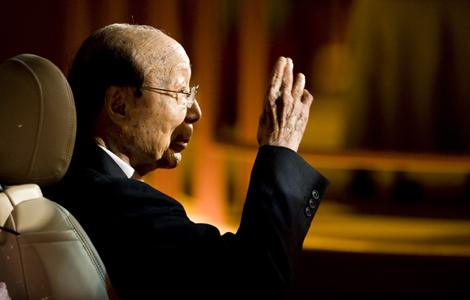Iran invited to Geneva 2, Syria opposition threatens
Updated: 2014-01-20 10:26
(Agencies)
|
|||||||||||
 |
|
United Nations Secretary-General Ban Ki-moon (R) greets Iran's President Hassan Rohani during the UN General Assembly at UN Headquarters in New York in this file photo taken Sept 26, 2013. Ban Ki-moon said on Sunday he had invited Iran to participate in Syria peace talks on Jan 22 in Montreux, Switzerland and that Tehran had pledged to play a "positive and constructive role" if it was asked to participate. [Photo/Agencies] |
UNITED NATIONS - Syria's political opposition said on Monday it will withdraw its attendance at international peace talks scheduled this week unless United Nations Secretary-General Ban Ki-moon retracts an invitation to Iran, President Bashar al-Assad's main backer.
Ban said earlier that he had invited Iran to attend the first day of talks on Jan 22 in Montreux, Switzerland and that Tehran had pledged to play a "positive and constructive role" if it was asked to participate.
Less than 48 hours since Syria's main political opposition group in exile, the National Coalition, agreed to attend the talks, dubbed "Geneva 2," it threatened to withdraw.
"The Syrian Coalition announces that they will withdraw their attendance in Geneva 2 unless Ban Ki-moon retracts Iran's invitation," it said in a Twitter post, quoting National Coalition spokesman Louay Safi.
Another senior Coalition member, Anas al-Abdah, told Al-Jazeera TV by phone that the body was "surprised" by the invitation to Iran. "It is illogical and we cannot in any way accept it."
Some 130,000 people have been killed and a quarter of Syrians driven from their homes in the civil war, which began with peaceful protests against 40 years of Assad family rule and has descended into a sectarian conflict, with the opposing sides armed and funded by Sunni Arab states and Shi'ite Iran.
Western and Gulf Arab nations say they have been reluctant to support the idea of Iran participating at all because it is supporting Assad militarily and has never backed a plan for a political transition in Syria agreed at an international conference in Geneva in June 2012.
BAN EXPECTS IRAN REPLY SOON
Ban said he had spoken at length with Iran's Foreign Minister Mohammad Javad Zarif in recent days and that he believed Tehran supported for the Geneva 2012 plan.
"He has assured me that like all the other countries invited to the opening day discussions in Montreux, Iran understands that the basis of the talks is the full implementation of the 30 June, 2012, Geneva communique," he said.
"Foreign Minister Zarif and I agreed that the goal of the negotiations is to establish by mutual consent a transitional governing body with a full executive powers," Ban said. "It was on that basis that Foreign Minister Zarif pledged that Iran would play a positive and constructive role in Montreux."
"Therefore as convener and host of the conference I have decided to issue an invitation to Iran to participate," Ban said. "Iran needs to participate as one of the important neighboring countries."
Ban said he expected Iran would issue a statement soon in response to his invitation.
Earlier this year the United States said that Iran might play a role on the sidelines of the Syria peace conference in Montreux. Tehran dismissed the idea of being relegated to the sidelines, saying it was beneath Iran's dignity.
The key players in the talks are Assad's government and opposition rebels. The Islamic Front, an alliance of several Islamist fighting forces that represents a large portion of the rebels on the ground, said on Sunday it rejected the talks, further dampening hopes of success.
Ban said he had invited on Sunday a total of 10 additional countries to attend on Jan 22 - the Vatican, Australia, Bahrain, Belgium, Greece, Luxembourg, Mexico, the Netherlands, South Korea and Iran. Speaking to reporters at UN headquarters, Ban made clear that the full negotiations between the government and opposition would begin in earnest on Jan 24 in Geneva.
Syrian opposition groups and Washington, which accuse Tehran of supporting Assad with manpower and arms during the uprising against him, have long had reservations about the participation of Iran, although Ban and the United Nations' special envoy on Syria, Lakhdar Brahimi, have long backed Tehran's involvement.
While there has been a warming in US-Iranian ties this year including a November 24 deal to curb the Iranian nuclear program, there are no visible signs that this has led to greater improvement in other areas such as Syria, where they are on opposite sides of the civil war.
Related Stories
Syrian opposition to attend Geneva II peace conference 2014-01-19 05:50
China welcomes agreement to implement Geneva deal 2014-01-13 19:05
Preparations for Geneva II 'on track': UN chief 2013-12-24 11:12
Today's Top News
Xi writes to Chinese in German colleges
China software to rival Android
Will China dominate the world?
Mainland policy lures HK students
Obama tells Germans he will not wiretap
Party is over for SOEs conferences
Egypt referendum wins support
Home prices continue to climb
Hot Topics
Lunar probe , China growth forecasts, Emission rules get tougher, China seen through 'colored lens', International board,
Editor's Picks

|

|

|

|

|

|





